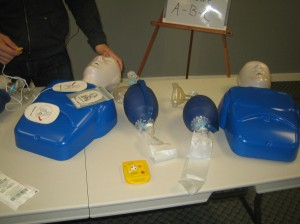CPR certification is offered by all six of our training locations all over the country. If you are in need for CPR training and training certification, our CPR courses have everything you could possibly need. We offer students quality training programs taught by instructors who are also certified. Courses are offered through the week, sometimes during evenings and weekends as well.
Getting a training certificate
Our five training programs are certification programs, three under Basic Life Support and two under Advanced Life Support. ACLS – Advanced Cardiac Life Support – is an ALS course that is completed over two days. When certification programs are completed, the trainee is awarded a training credential that is valid for a total of two years.
Renewal of certificates is done through re-certification classes. However, only rescuers with certificates that have not expired yet can sign up for re-certification. We do not renew certificates that have expired, only certificates that are nearing expiration.
Enrolment
Enrolment for our programs is quite easy. You can visit the location website and use the online form to sign up for ACLS training. Similarly, you can use e-mails and telephone calls to enrol. We highly encourage our students to sign up in person during normal business hours.
Advanced Cardiac Life Support

ACLS training is a 16 hour program that is completed over two days. ACLS is categorized under Advanced Life Support training, training for HCPs (healthcare providers). ALS is based on the concept in Basic Life Support but uses medical interventions when addressing cardiac arrest.
Cardiac arrest occurs when the heart stops beating and cannot pump blood to the rest of the body. In order to restore the circulation of blood, chest compressions and rescue breaths. Rescue breaths oxygenate the blood and compressions manually pump blood to the body until spontaneous beating of the heart is restored. These are the basics skills and concepts under BLS training. With ALS, the use of additional medical interventions is done – primarily medication, equipment, and diagnostics.
Trainees are taught adult and pediatric pharmacology, two concepts that are very different, especially when it comes to dosage and indication. A normal dose for an adult can be fatal to the immature organs of a pediatric patient. Pediatric is a term used to describe patients younger than 18 years old but difference in medication administration is more apparently see from infants to school-age children.
Likewise, we teach students about bag valve masks (BVMs), electrocardiograms (ECGs), ventilatory assist devices, and other medical equipment. We teach them about the “crash cart”, a movable cabinet complete with all the medication and equipment used when a patient codes (goes into cardiac arrest). The cart has intubation sets, BVMs, and a defibrillator. AEDs are used to give electrical shock to the heart to return it to normal sinus rhythm. Defibrillation is never done to a victim in asystole (flatline).
Re-certification for ACLS
ACLS re-certification is available and runs from five to six hours over a single session. Only students with valid certification apply for renewal. If not, he or she has to retake the entire 16 hour ACLS program.